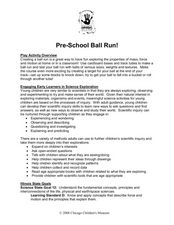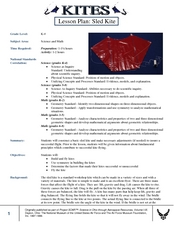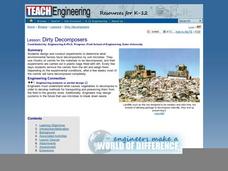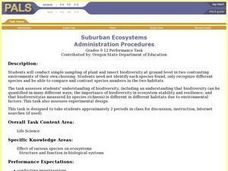Curated OER
Kites: Patang - The Indian Fighter Kite
Students investigate the history of fighter kites and build their own. In this aeronautics lesson, students discover how other countries utilize fighter kites and where they originated. Students create their own fighter kites in class...
Curated OER
Bird Populations
Students gather data about bird populations. They study bird migratory patterns using the methods that researchers use. They write an essay explaining the differences between the four types of population movements.
Curated OER
Survival
Students determine the best material from which to make a jacket to keep the body warm in a cold, dry, windy climate. This task assesses the student's abilities to perform an entire investigation.
Nazareth College
Create Your Own Tornado
Third graders identify key concepts and definitions about tornados. They work in small groups of three to four to create mini-tornados. After reading Tornado Alert as a class, 3rd graders discuss tornados and fill out a KWL chart.
Curated OER
Pre-School Ball Run
Students demonstrate force and motion by rolling a ball through a tube. In this motion lesson students explore what happens to the ball when it is rolled with other balls of various sizes, weights, and textures.
Curated OER
Schoolyard Field Guide
Fourth graders observe, plan, research, and create a field guide for the trees that are in their schoolyard. In this trees lesson plan, 4th graders make careful observations of what they see around their school and create a guide.
Curated OER
What Can We Lose? What Do We Lose as we Gain Force With A Lever?
Third graders view a demonstration of a teeter totter as a basis for assessing pre-knowledge of a lever. They create a KwL chart. Students work in small groups to conduct a variety of experiments. The first requires students to tie books...
Curated OER
Balloon Rocket
Students observe a balloon rocket and how it relates to Newton's Third Law of Motion. In this balloon rocket lesson plan, students make a balloon rocket out of balloons, clothespins, straw, fishing line, and duct tape.
Curated OER
Sled Kite
Learners make and fly a sled kite out of plastic garbage bags, dowel rods, and more. In this kite lesson plan, students plan the kite to have symmetry and make adjustments as they test it.
Curated OER
Conveyor Belt Production
Students design a system that will move their glass product across a room in the plant. They must move the product 12 feet and their items cannot fall off at any time.
Curated OER
How Effective is Perspiration at Cooling?
Students collect data on the cooling of water in two different test tubes, one that is wrapped in wet newspaper and one in dry newspaper. They then relate this cooling effect to the body's perspiration.
Curated OER
Are Enzymes Specific for Their Substrates?
Students discover enzyme to substrate specificity. The experiment uses samples of glucose and lactose in combination with the enzyme lactase. Students observe the reaction between the lactose and the lactase; the lack of a reaction...
Curated OER
Water Regulation
Students use their basic knowledge of physiology to analyze graphical data of paramecia under diverse conditions. From the data analysis, Students develop explanations of the animal's response to the concentration of different solutions...
Curated OER
How Do The Colors of Light Mix?
Students investigate the mixing of light. They form a hypotheses to reason why color changes occur and they write conclusions and ask new questions arising from the investigation. Students identify the primary and complementary colors of...
Curated OER
Dirty Decomposers
Seventh graders design and conduct experiments to determine what environmental factors favor decomposition by soil microbes. They use chunks of carrot for the materials to be decomposed, and their experiments are carried out in plastic...
Curated OER
Floating Soap
Students explore the density of soap. In this science lesson, students conduct an experiment to find which types of soap will float. Students make a hypothesis and record their observations.
Curated OER
Suburban Ecosystems
Students conduct simple sampling of plant and insect biodiversity at ground level in two contrasting environments of their own choosing. They recognize and record different species then compare and contrast species numbers in the two...
Curated OER
Opposites Attract
Pupils demonstrate the attraction of small pieces of paper to a charged plastic rod and conduct experiment with other objects to determine whether they can hold a charge. They then use online applets to apply their experiments to...
Curated OER
VERTEBRATES
Seventh graders describe the main characteristics of warm-blooded vertebrate animals. They compare and contrast the two different groups of warm-blooded vertebrate animals by looking at external, reproductive, and growth characteristics.
Curated OER
Boyle's Law
Students experiment on Boyle's law using balloons and other common materials. In this chemistry instructional activity, students explain the relationship between pressure and volume. They solve problems relating to Boyle's Law.
Curated OER
Deep Freeze
Students practice various sampling methods for retrieving data under water, ice, and soil. They use the sample material to make temperature measurements, chart contents, and draw their own conclusions as to what is happening in the...
Curated OER
Using Triangulation to Locate Meteorites from Witnessed Falls
High schoolers participate in a mock investigation in which they must interview and record data given by 3 people ("witnesses") in an effort to triangulate the location of a meteorite.
Curated OER
Journal of the Stars
Students receive balloons representing the "Life Cycle of the Stars." As the attached script is read, students follow the directions for the color of balloon they are given. Students chart the results for their star. They plot data from...
Curated OER
"Hard" Data from Space
Students use satellite images to analyze development patterns within Baltimore City. They prepare a land cover map for Baltimore indicating the prevalence of impervious surfaces and explore how these patterns affect water pollution.

























